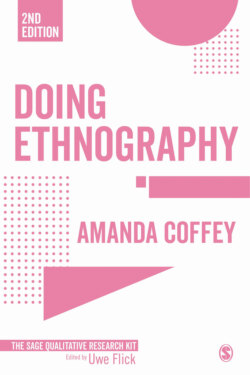Doing Ethnography

Реклама. ООО «ЛитРес», ИНН: 7719571260.
Оглавление
Amanda Coffey. Doing Ethnography
Doing Ethnography
Contents
Editorial introduction
Introduction to The SAGE Qualitative Research Kit
What is qualitative research?
How do we conduct qualitative research?
Scope of The SAGE Qualitative Research Kit
About this book
Acknowledgements
Chapter One Introduction The foundations of ethnography. contents
Objectives
What is ethnography?
A brief history of ethnography
The methodological contexts of ethnography
Feminist ethnography
Postmodernism
Principles and practices
Key points
Chapter Two Ethnography and research design. contents
Objectives
Designing an ethnographic project
Identifying suitable topics and problems
Fields of study and developing research questions
Methods of data generation
Analysis and reflection
Key points
Chapter Three Sites, cases and participants. contents
Objectives
Starting from where you are
Selecting a field site
Selecting cases and choosing informants
Getting in – accessing the field
Key points
Chapter Four In the field Observation, conversation and documentation. contents
Objectives
Making data
Initial fieldwork and first days in the field
Participant observation and FIELD notes
Ethnographic conversations
Documentary realities of social life
Key points
Chapter Five Field roles and relationships. contents
Objectives
The researcher and the field
What we bring to fieldwork
Roles in the field
Relationships in the field
Leaving the field
A note on ethnography and autobiography
Key points
Chapter Six Managing and analyzing ethnographic data. contents
Objectives
Beginning data analysis
A note on data organization and management
Looking for patterns and meaning
Narratives, metaphors and symbols
Analyzing and theorizing
Computer-aided analysis
Key points
Chapter Seven Representation and the writing of Ethnography. contents
Objectives
Ethnography as production
The writing of ethnography
Rethinking ethnographic representation
Other ways of ‘writing’ ethnography
Dialogic approaches to producing ethnography: ethnodrama and ethnotheatre
Poetry and prose: ethnopoetry
Storytelling: ethnographic fiction
Autoethnography: writing selves
Ways of seeing: beyond writing
Key points
Chapter Eight The Future(s) of Ethnography. contents
Objectives
The moments of ethnography
New global and local contexts for ethnography
A changing research culture
The future(s) of ethnography
Back to the future
Key points
Glossary
References
Index
Отрывок из книги
For Jake – I promised you a book.
In recent years, qualitative research has enjoyed a period of unprecedented growth and diversification as it has become an established and respected research approach across a variety of disciplines and contexts. An increasing number of students, teachers and practitioners are facing questions and problems of how to do qualitative research – in general and for their specific individual purposes. To answer these questions, and to address such practical problems on a how-to-do level, is the main purpose of The SAGE Qualitative Research Kit.
.....
Like qualitative research more generally, ethnography has also been shaped by, and has helped to define feminist scholarship and research practice. The dialogue between feminism and ethnography can be situated within feminist critiques of social science and social research more generally. There have been nuanced understandings of the ways in which the ideologies of gender have structured the social relations of research, alongside considerable philosophical debate about the gendered nature of knowledge (Harding, 1987; Ramazanoglu and Holland, 2002). Feminist theorists have critiqued some of the established assumptions that have underpinned social scientific inquiry, calling into question underlying perceived dichotomies – such as objectivity/subjectivity and rationality/emotionality – as well as repositioning and restating knowledge as grounded, local, partial and temporally situated. Such insights have led to a feminist research agenda and to a recasting of feminist social research – where the conditions of knowledge production are critically acknowledged and accounted for, where issues of power are recognized in the research process and in relation to research production, and where epistemology and ontology are central (Letherby, 2003). As Stanley has eloquently described, ‘feminism is not merely a perspective, a way of seeing; nor even this plus an epistemology, a way of knowing; it is also an ontology, a way of being in the world’ (1990, p. 14).
It is now widely accepted that feminist research methods can incorporate a wide variety of approaches, both quantitative and qualitative; as Letherby (2003) notes, feminists can count as well as quote. It is certainly not the case that some methods are more inherently feminist than others, and feminist scholars have used a variety of approaches to empirical work and knowledge creation. Within that general context, feminist researchers have used and developed ethnographic approaches to reveal women’s standpoints (Farrell, 1992; Langellier and Hall, 1989) and have debated the representation of feminist ethnography in and through the production of texts (Behar and Gordon, 1995; Clough, 1992). Feminist anthropologists, for example, have engaged in an epistemological and methodological project towards establishing a distinctive feminist ethnography (see Jennaway, 1990; Schrock, 2013; Walter, 1995). Abu-Lughod (1990) posed the question as to whether there can be a feminist ethnography, and if so what that might look like. This included a focus on the ways in which feminist ethnography might enable exploration of the relationship between feminism and reflexivity, troubling the distinction between objectivity and subjectivity, and considering the power in and of writing. Abu-Lughod spoke of an ‘unsettling of the boundaries that have been central to its identity as a discipline of the self-studying other’ (1990, p. 26). Jennaway similarly argued that postmodern discourses in ethnography borrowed from and emerged out of feminist preoccupations and articulations, including a move towards egalitarian relations of textual production, more dialogic and collaborative approaches and a ‘move away from systems of representation which objectify and silence the ethnographic other’ (1990, p. 171). Reflecting on the methodological imperatives of feminist ethnography in contemporary times, Schrock (2013) identifies the importance of representation (both its benefits and detriments) and ethical responsibility towards the communities where researchers work and study.
.....